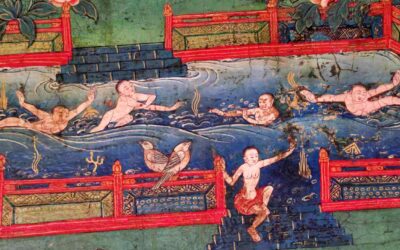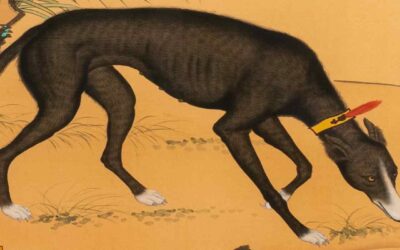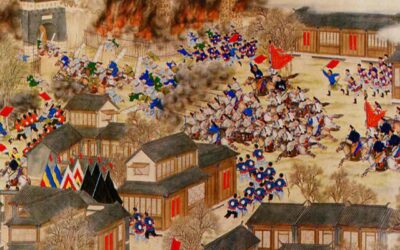In Peter Goullart The Monastery of the Jade Mountain.
Unlike the Bible and the Koran. the Taoteking does not refer to the historical processes which led men, or rather a particular tribe among men, to the idea of One God. Neither does it describe in detail how this planet of ours came to possess plants, animals and men. According to the Taoteking the prima causa of existence’ is unknowable and hidden in a mystery more profound than all other mysteries. An ineffable rhythm had filled the Void and the interplay of its opposites, Yang and Yin, produced ‘Ten Thousand Things’.
The void
The Void of the Taoteking is not ‘nothing’ but, on the contrary, a ‘Mother’ of all seen and unseen ; the container of all possibilities, all forces, all dimensions of time and space and all spiritual and physical phenomena. It is the Godhead or Primordial Buddha of Ashvagosha, the great Patriarch and interpreter of Mahayana Buddhism, and the Brahma of Hinduism. All and everything issues from the Void, plays its appointed role and returns into the Void. This objectification of the Void in time and space or ‘being ‘—the Maya of Buddhism— is through and in Tao which is the Logos and Providence of the Christians and the Vishnu of the Hindus.
This Divine Current is above time, space and ‘existence’ itself but It fills, guides and nourishes all the Universe according to Its own laws. It is Infinite Love, Infinite Wisdom and Infinite Simplicity and contains all infinite potentialities. It is beyond all the attributes known to human mind and, therefore, Its nature is beyond all comprehension. It is the Divine Will in action.
Meaning of the Tao
Laotse called it Tao, a word which, he himself admitted, he chose for convenience sake. That of which he wrote has no name, being infinite and indescribable in earthly language. He had refrained from using the word ‘God ‘ because in Chinese connotation it always denotes some anthropomorphic deity, more often than not of a comparatively low rank. The word ‘Tao’ means ‘Way’ or ‘Road’ and it conveys a more sublime idea to the mystic who can thus imagine the Divine Spirit as a majestic road along which the world and our lives are moving.
Being a profound mystic and a shrewd observer of nature and men, Laotse evolved during his long life a definite concept of the laws according to which the Divine Tao acts in the world. He found out, undoubtedly from personal experience, that if man closely followed these laws, he would find a wonderful comfort and happiness in his identification with the Divine and that the Gates of Nirvana, the ultimate bliss and a key to the meaning of life, would be opened to him at the end of his peregrinations.
He penned his observations with such economy of words that the Taoteking reads more like an index of what Tao is and what man should do to merge himself into It rather than a book. Generally speaking, in my opinion, the Taoteking enunciates the Divine Laws as applicable to the whole Universe, while Christianity demonstrates the working of these laws as applied to the planet Earth.
Last posts
Most Frequent Scenes from the Life of the Buddha in Tibetan Art
Most Frequent Scenes from the Life of the Buddha in Tibetan Art In fact, only a few moments are repeated very frequently in Tibetan paintings. In some versions there are eight—an auspicious number for Tibetans, corresponding to the Noble Eightfold Path and the eight...
The Dog as Psychopomp in China
The Dog as Psychopomp in China One of the oldest human beliefs was that after death there existed an immaterial part of the person—later called the soul or spirit—that did not disappear with the body. Its origin may lie in the “presence” of the dead in dreams,...
An ambitious project to rewrite history
An ambitious project to rewrite history. It is what we see in Lhamsuren Munkh-Erdene, The Nomadic Leviathan. A Critique of the Sinocentric Paradigm. Brill. Leiden. 2023. Now free to download in the publisher’s webpage. This book is a critique of a theoretical paradigm...







